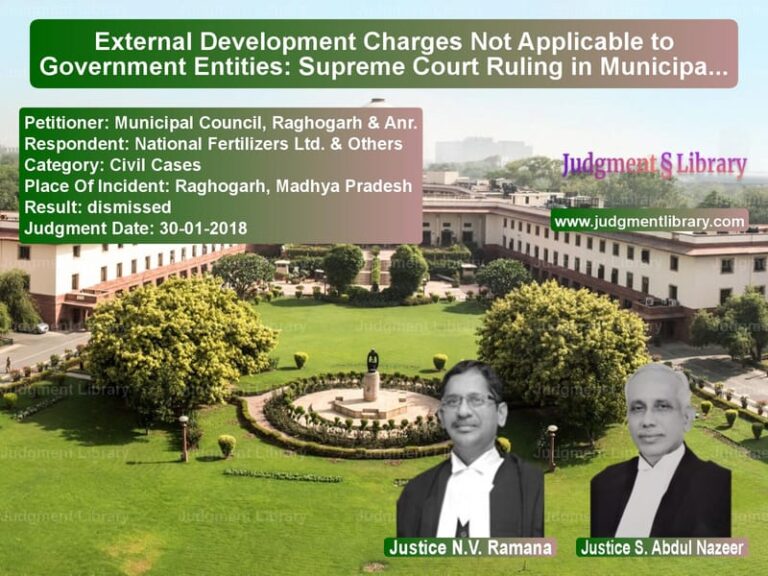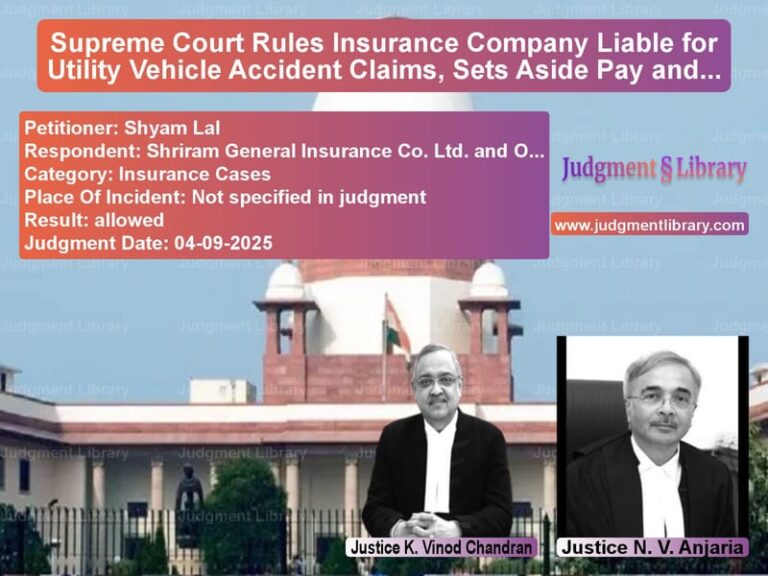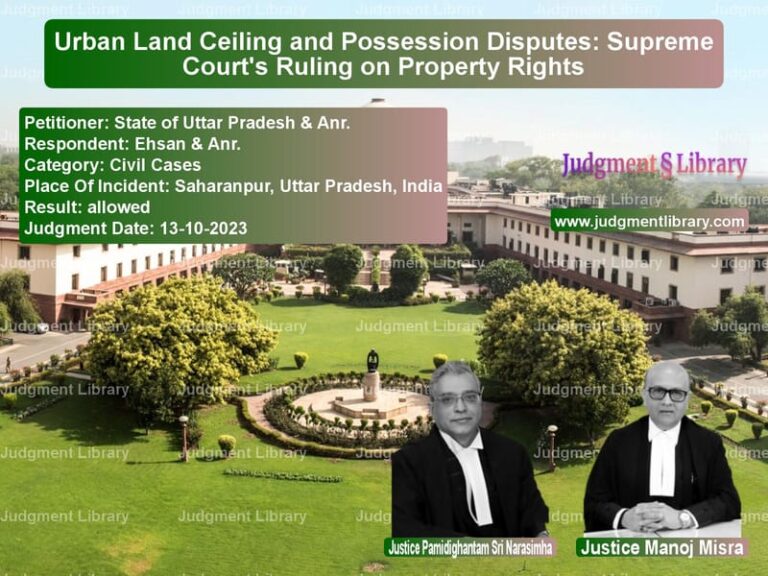Right to Information and Banking Transparency: Supreme Court’s Landmark Decision on RBI’s Disclosure Obligations
The Supreme Court of India in its judgment dated April 26, 2019, addressed a crucial issue regarding the Right to Information (RTI) Act and the Reserve Bank of India’s (RBI) duty to disclose information to the public. The case revolved around contempt petitions filed against the RBI and its officials for allegedly disobeying the Court’s earlier ruling in Reserve Bank of India v. Jayantilal N. Mistry, where the Court had mandated the disclosure of banking information sought under the RTI Act.
Background of the Case
The case originated when several petitioners sought information from the RBI regarding banking irregularities, including details of loan defaulters, penalties imposed on banks, and inspection reports. The RBI refused to disclose the information, citing exemptions under Section 8(1)(d) and (e) of the RTI Act, which relate to fiduciary relationships and commercial confidence.
The matter was initially adjudicated in 2015, where the Supreme Court ruled that the RBI could not deny such information, as it had a statutory duty to act in the public interest. Despite this ruling, the RBI continued to withhold the information, prompting petitioners to file contempt petitions alleging non-compliance with the Court’s directions.
Petitioner’s Arguments
The petitioners argued that the RBI was deliberately withholding information despite clear directives from the Supreme Court. They highlighted specific instances where the RBI had either refused to provide information or had issued new policies contradicting the Court’s ruling.
In one of the contempt petitions, the petitioner sought details regarding losses incurred due to foreign derivative contracts, estimated at ₹32,000 crores. The RBI initially refused to provide the requested information, prompting the petitioner to approach the Court. Similarly, another petitioner sought details of show-cause notices and penalties imposed on various banks, which the RBI refused to disclose.
Respondent’s Defense
The RBI, represented by senior counsel, argued that there was no intention to disobey the Court’s directives. They contended that the information sought was sensitive and could harm economic interests if disclosed. The RBI also argued that its disclosure policy, introduced in 2016, was meant to align with national security and economic stability concerns.
Furthermore, the RBI contended that if the petitioners were dissatisfied with the information provided, they should file fresh RTI applications instead of contempt petitions.
Supreme Court’s Observations
The Supreme Court, after reviewing the submissions, strongly criticized the RBI for failing to adhere to its previous ruling. The Court reaffirmed that the RTI Act overrides all earlier laws and that the RBI is duty-bound to disclose information unless specifically exempted under Section 8(1) of the Act.
Quoting from its earlier judgment, the Court reiterated:
“The argument of the RBI that the information sought for by the Respondents was rightly refused on the ground of fiduciary relationship was rejected by this Court. It was observed that there is no fiduciary relationship between the RBI and the financial institutions, and by attaching an additional ‘fiduciary’ label to the statutory duty, regulatory authorities have created an in terrorem effect.”
The Court further held that withholding banking information on the pretext of economic security was unjustified:
“The submission made on behalf of the RBI that the disclosure would hurt the economic interests of the country was found to be totally misconceived.”
Key Legal Takeaways
The Supreme Court’s ruling established several important legal principles:
- RTI Act Overrides Other Laws: The Right to Information Act supersedes earlier regulations that restrict public access to information.
- Fiduciary Relationship Does Not Apply: The RBI cannot claim fiduciary privilege over information concerning banks and financial institutions.
- Public Interest Takes Precedence: The RBI’s duty to safeguard public interest outweighs its concerns about economic impact or commercial confidentiality.
- Disclosure of Inspection Reports: The RBI is mandated to disclose inspection reports and regulatory findings concerning banks.
- Non-Compliance Can Lead to Contempt: Any deliberate withholding of information in violation of court orders can attract contempt proceedings.
Final Judgment
The Supreme Court ruled in favor of the petitioners and held that the RBI was in contempt of court for failing to disclose the mandated information. The Court warned the RBI that any further violations would be dealt with seriously. It directed the RBI to remove its restrictive disclosure policy and ensure full compliance with the RTI Act.
The Court also observed:
“We do not agree with Mr. Gupta that a contempt petition is maintainable only at the behest of a party to the judgment. The directions issued by this Court are general in nature, and any violation of such directions would enable an aggrieved party to file a contempt petition.”
Conclusion
This landmark ruling reinforces the transparency obligations of regulatory bodies like the RBI. It ensures that banking information, particularly concerning defaulters, penalties, and regulatory actions, remains accessible to the public. The judgment serves as a critical precedent in upholding the spirit of the RTI Act and promoting accountability in the financial sector.
Petitioner Name: Girish Mittal.Respondent Name: Parvati V. Sundaram & Anr..Judgment By: Justice L. Nageswara Rao, Justice M.R. Shah.Place Of Incident: India.Judgment Date: 26-04-2019.
Don’t miss out on the full details! Download the complete judgment in PDF format below and gain valuable insights instantly!
Download Judgment: Girish Mittal vs Parvati V. Sundaram Supreme Court of India Judgment Dated 26-04-2019.pdf
Direct Downlaod Judgment: Direct downlaod this Judgment
See all petitions in Fundamental Rights
See all petitions in Public Interest Litigation
See all petitions in Constitution Interpretation
See all petitions in Judgment by L. Nageswara Rao
See all petitions in Judgment by Mukeshkumar Rasikbhai Shah
See all petitions in allowed
See all petitions in supreme court of India judgments April 2019
See all petitions in 2019 judgments
See all posts in Constitutional Cases Category
See all allowed petitions in Constitutional Cases Category
See all Dismissed petitions in Constitutional Cases Category
See all partially allowed petitions in Constitutional Cases Category







